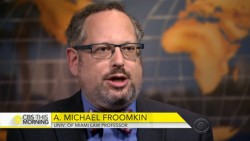 The government’s attempt to get Apple to build a bespoke operating system so they can brute force access to an iPhone without it erasing its data has led the media to some of us who were in the first round of the crypto wars. Today was my turn. A few seconds on CBS in the Morning, ink in a nice explainer by Steve Lohr in the New York Times. I also spoke to the LA Times and the Wall St. Journal, but I haven’t seen what if anything they made of it.
The government’s attempt to get Apple to build a bespoke operating system so they can brute force access to an iPhone without it erasing its data has led the media to some of us who were in the first round of the crypto wars. Today was my turn. A few seconds on CBS in the Morning, ink in a nice explainer by Steve Lohr in the New York Times. I also spoke to the LA Times and the Wall St. Journal, but I haven’t seen what if anything they made of it.
I presume they found me because I wrote the first US legal article on law and encryption: The Metaphor is the Key: Cryptography, the Clipper Chip and the Constitution. There’s also a shorter sequel that some find easier to read, It Came From Planet Clipper.
The Apple case potentially raises at least these major legal issues:
- To what extent the government can use the All Writs Act to compel people unrelated to a case to provide unwilling technical support–here, Apple says, 12-40 man-weeks of expert engineering–to the government’s efforts to disable a security system in order to effectuate a search warrant or similar court order;
- Whether ordering a firm to write code (here, a bespoke phone OS), is a form of compelled speech violating the First Amendment
- Whether ordering a firm to digitally sign that code (or anything else) is an impermissible form of compelled speech
- Whether if a court can issue this order requiring assistance to disable a security system without violating the Constitutions, it follows that Congress could also legislate to forbid people from building strong security systems that the government cannot break into unassisted — and, most critically, whether that would mean the government could forbid the deployment of strong cryptographic tools without back doors. (This last issue was the main subject of the two articles I linked to above. It’s not a simple question.)
Although the Apple issue likely will be decided on non-constitutional grounds, the parties are making a record on the constitutional issues with an eye to a set of appeals that could go as far as the Supreme Court. The issues are important and interesting, so the media is right to treat this as a big deal.

It is a big deal, but if we consider that the American Revolutionary War was won by patriot “snipers” gunning down row after row of “proper” British soldiers who refused to take cover, maybe it’s time to consider that Isis is using the traditions and rights we hold dear to divide and defeat us.
For as much as I believe any privacy really exists anymore when you read article after article about hackers getting into everthing, I also believe that the majority of judges don’t hand out search warrants without probable cause, and I don’t think there is an American alive today that doesn’t agree with that issue that there is probable cause to have a look at the I phone in this case. Apple is “grandstanding” because once this technology is built a judge will still be the gate keeper. And what kind of a democracy are we really if we are so mistrustful of the people we elect that we would allow companies to deploy strong cryptographic tools with no back doors. Sounds like anarchy to me, but then there is already a civil war going on here…the media just hasn’t figured it out yet.